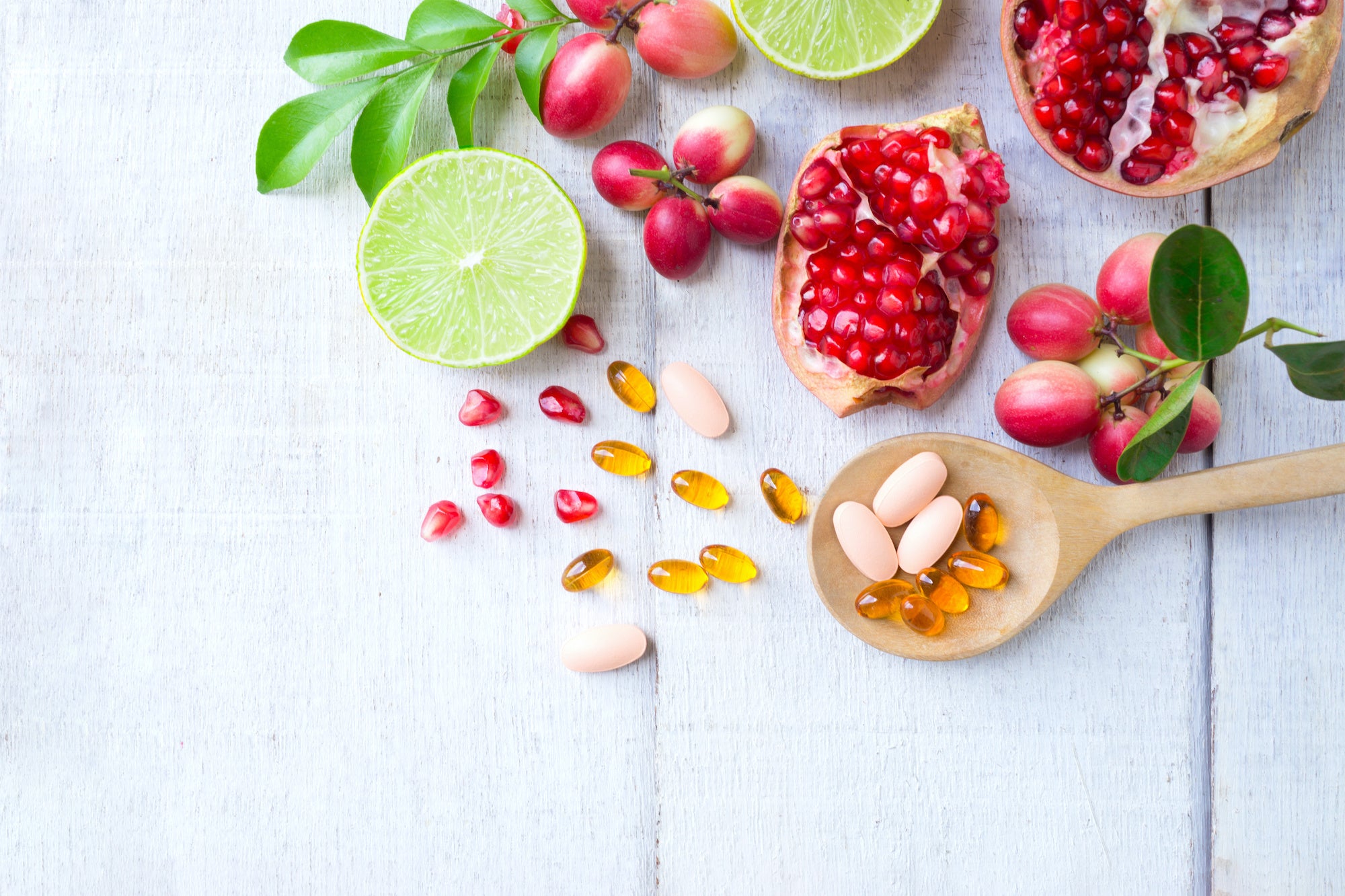
9 Immune Boosting Foods and Vitamins
Diet and nutrition contribute to our overall health. It’s not exactly a state secret that our diet impacts our health and wellness. But, did you hear that your diet also affects your immune system?
In fact, with a little knowledge and some proactive meal planning, you can give your body’s defenses a valuable boost! Here are a few simple and effective foods and vitamins that you can incorporate to promote your immune health.
1. Protein
If you’re a gym bunny, you may already know that protein is the number one for building muscle and recovering from injuries. How else are you going to achieve that Schwarzenegger-like physique?
Protein has another secret talent, though: supporting your immune system! One study even called protein levels the “most important predictor” of healthy immunity. Protein helps fight viral and bacterial infections and powers your body’s illness-fighting antibodies.
On the flip side, a protein deficiency can leave your system vulnerable. It’s important to consume a sufficient amount, and deficiency-prone vegetarians should be especially careful!
FOODS RICH IN PROTEIN:
- Chicken and turkey
- Beef
- Soy
- Beans
2. Garlic
We have a love-hate relationship with garlic, it’s true. We love its aromatic presence in our Italian food but hate the reek it leaves on our breath. When it comes to our immune system, though, we can unanimously agree that garlic is a winner.
Studies show that garlic is valuable as both an immunoregulator and an anti-inflammatory. In layman’s terms, it helps your immune system maintain balance and reduce swelling (which might otherwise interfere with quick healing).
It may also stimulate the production of immune cells, fight infections, and even battle cancer and cardiovascular diseases. Sounds worth trying, huh?
There are a few different ways you can harness garlic’s epic immune power. One, of course, is to eat more garlicky dishes, though vampires (and your loved ones) might start to keep their distance.
Another way is to consume raw garlic cloves on their own. But if you have a sensitive stomach or a tendency towards heartburn, you may want to check out the side effects first. (For one, the smell of garlic may start emanating from your pores. UGH.)
For ease, you can also purchase garlic supplements. If you're already taking any medications, just be sure to check with your doctor first!
If you do incorporate a supplement into your routine, be a little choosy. Ideally, aim for a supplement with at least 4,000mcg of allicin, the active antibacterial in garlic. (A 700-900mg dose of garlic should contain that amount.)
If you have a sensitive stomach, look for “enteric-coated” supplements, which protect the ingredients until they can disperse in your small intestine.
Though it seems backward, also avoid the odor-free option. Some odor-free garlic supplements undergo a cooking process that damages the garlic’s natural effectiveness. Instead, consider a supplement that uses "aged garlic." This can reduce the supplement's odor without subjecting it to cooking.
The things we do for a healthy immune system! Guess we’ll just be over here, living our best (and stinkiest) life!
3. Green Tea
Green tea is one of those wonder ingredients that you’ve heard recommended by everybody and their grandma. Well, there’s a reason for all the hype! Green tea is most popular for weight loss, but we love it for being antioxidant, anti-cancerous, and antimicrobial.

That’s right, this dietary warrior is armed and ready to fight, taking on almost any health scare you encounter. Green tea helps you resist both bacterial invaders and viruses, stimulating your immune response so that your body is ready to repel any sudden attacks. It may even help produce germ-fighting compounds, thanks to the amino acid L-theanine.
Prefer black tea? Sorry. In this case, green tea is undeniably superior. Black tea’s fermentation process destroys the antioxidant EGCG, a prime compound in green tea that enhances our immune system.
Green tea also boosts your health by inducing a process called autophagy. Autophagy means “self-eating,” and that’s what it’s doing — cleaning out your body’s old and dysfunctional cells and replacing them with shiny new ones. This helps us purge toxins, prevent neurodegenerative diseases like Alzheimer’s, and regenerate like we’re time lords from Doctor Who. (Who doesn’t like their immune booster with a side of anti-aging?)
Exciting, we know, but you don’t need to go crazy. A few comfortable cups a day should be enough to reap green tea’s spectacular benefits!
4. Yogurt
Jamie Lee Curtis worked hard to inform us that the bacteria in yogurt are good for digestion. Those same bacteria and cultures also serve another purpose — stimulating your immune system.
Early observations suggest that some yogurt bacteria reduce your risk of catching a cold, lessen the duration of infections, and lower allergy symptoms. Some bacteria also seem to increase your count of natural killer cells, which are as awesome as they sound. NK cells help your body reject invasive cells like viruses and even tumors!
Wow! Ready to eat some yogurt yet?
Focus on plain, unsweetened yogurt for the best benefits. Greek yogurt or Icelandic-style skyr are excellent choices, packed with protein. Too bland for you? Just add your favorite fruit, nuts, and honey! Bonus points if you can find a brand fortified with vitamin D, which also contributes to the regulation of your immune system.
5. Vitamin C
Okay, duh. Everybody knows that vitamin C is an immune booster. That’s why orange juice suddenly vanishes from store shelves during flu season. (That, and we need a mixer for our mimosas!)
But what is vitamin C doing for your body?

Vitamin C is a powerful antioxidant that supports cell function and protects our internal molecules, strengthening immune defenses. It helps prevent and treat infections and spur your immune cells to the site of an illness more quickly.
Shockingly, vitamin C is the fourth most common deficiency in the US. Deficient vitamin C causes impaired immunity and a higher chance of contracting infections. Just look at scurvy — this disease was once the bane of pirates and sailors, who had limited access to fresh food. Eventually, they wised up and started stocking C-rich citrus fruits on board!
We need to be as conscious of our vitamin C intake as those old-timey pirates because our body doesn’t produce vitamin C or store it in the long term. We need regular consumption to keep our levels up.
Luckily, vitamin C is abundant in natural food sources! Unless you’re particularly worried about your immune system or living on a fast-food-only diet, you probably don’t need to add a supplement.
FOODS RICH IN VITAMIN C:
- Citrus (especially oranges, tangerines, and grapefruit)
- Strawberries
- Mango, papaya, and pineapple
- Bell peppers
- Spinach and kale
- Broccoli and cauliflower
If you do add a supplement (just in case), bear in mind that 200 mg per day is a perfectly adequate dose for immune maintenance. You’d only need a higher dosage to combat established infections.
HOT TIP: Did you know that vitamin C is also amazing for skincare?
6. Vitamin A
Vitamin A, often found in red and orange produce, is another immune star. It helps build your immune system from the ground up, develop your defenses, and manage your body’s response to infection. A healthy supply of vitamin A can help prevent and treat infectious diseases before they become too entrenched!
Vitamin A is so important that your immune system needs constant intake to keep crucial immune organs functioning. Vitamin A deficiency can cripple immune responses and prevent healthy cell turnover in your bone marrow.
Fortunately, the recommended intake of vitamin A is easily obtainable through a well-rounded diet. Food is the best way to get your fix of vitamin A. High-concentration supplements are discouraged, as a vitamin A overdose can be toxic.
No, thank you! We’ll eat the veggies instead!
FOODS RICH IN VITAMIN A:
- Broccoli and spinach
- Sweet potatoes
- Carrots
- Mango and cantaloupe
- Pumpkin and butternut squash
- Red bell peppers
- Tuna fish
7. Vitamin E
You may be familiar with vitamin E from its popularity in skincare. Heck, you’ve probably seen it on our site! We use this powerful antioxidant in nearly all of our products to moisturize, fight environmental damage, and protect your skin.

If that’s not great enough, it turns out that this vital nutrient is also fantastic for helping your body fight off infection!
Vitamin E has been shown to improve cellular immunity, especially as we age and our immune system naturally begins to weaken. To retain youthful and healthy defense, keep vitamin E intake on your meal-planning radar!
FOODS RICH IN VITAMIN E:
- Nuts and seeds
- Spinach
- Avocados
8. Vitamin B6
In the vast realm of vitamins, B6 may not be the most obvious. But this workhorse is essential to biochemical reactions that help your immune system run smoothly!
Plus, it contributes to the formation of red blood cells, which carry oxygen around your body. A lack of red blood cells can lead to anemia, leaving you feeling weak and exhausted.
Ain’t nobody got time for that!
FOODS RICH IN VITAMIN B6:
- Chicken, salmon, and tuna
- Green vegetables
- Chickpeas (hummus, anyone?)
9. Zinc
Last but not least, we have zinc! This mild-mannered nutrient is often overlooked in our diets, and a large percentage of people in the US are borderline zinc deficient. Bad news bears, because zinc is essential to the upkeep of a smooth-running immune system and resistance to nasty pathogens.
If you think you’re in that borderline group, it’s okay. Don’t panic! This is a very fixable problem. Zinc is available in a lot of meats and legumes.
FOODS RICH IN ZINC:
- Oysters, crab, clams, lobster, and mussels
- Red meat
- Chickpeas, lentils, and beans
- Cashews and pumpkin seeds
Overwhelmed? Don’t worry, it’s easier than it sounds! Start with a little protein. Then just try to add a balanced rainbow of fruit and veggies, and you’ll cover a lot of the vitamin spectrum.
Bonus: Our body absorbs nutrients better when they come from food rather than supplements. So eating your vitamins in actual meals is the most efficient strategy!
Just remember that this isn’t a one-and-done. To best serve your immune system, you’ll need to maintain good habits over time, not just go on a crazy produce binge this weekend.
But, if you want to start with a produce binge...more power to you!







